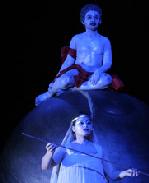SITE GUIDE
SEARCH
REVIEWS
FEATURES
NEWS
Etcetera and
Short Term Listings
LISTINGS
Broadway
Off-Broadway
NYC Restaurants
BOOKS and CDs
OTHER PLACES
Berkshires
London
California
DC
Philadelphia
Elsewhere
QUOTES
On TKTS
PLAYWRIGHTS' ALBUMS
LETTERS TO EDITOR
FILM
LINKS
MISCELLANEOUS
Free Updates
Masthead
Writing for Us
A CurtainUp Los Angeles Opera Review
L’Incoronazione di Poppea
(The Coronation of Poppea)

Marcus Moses as Child Amore and Hanan Alattar as Amore
|
Written in the age of Shakespeare by 75-year-old Italian composer Claudio Monteverdi and directed by Pierre Audi at the Los Angeles Opera, Monteverdi’s last masterpiece is unique on many levels. Poppea is the first opera to stress the importance of text over music, straddling the gap between mythological and historical subjects by combining the two.
Audi, who specializes in Monteverdi’s operas, first created this production for Amsterdam’s Nederlandse Opera, but the look is just as diverse as the composer’s sources. The text itself is graphically sensuous and Audi’s sexy production depicts the passion between Nero and Poppea and also, in a beautiful Act II duet, between Nero and a pageboy.
Monteverdi’s text also touches on the virtues of peace from Seneca and the tragedies of age from Ottavia, Nero’s disdained Empress. The voluminous sparkling costumes with their rich and varied textures have classical elements but more than a trace of the popular Kabuki trend, not surprisingly, as they were created by Japanese designer Emi Wada, who won an Academy Award in 1986 for Akira Kurosawa’s Ran. Audi’s longtime scenic collaborator Michael Simon complements the opulence of the costumes with a stark set, whose primary elements are large boulders.
The Roman Emperor Nero, instead of fiddling while Rome burns, is visited here by many gods and goddesses while fiddling with the beautiful Poppea whom he wishes to make his Empress, replacing the stately Ottavia. The deities here represent psychological aspects vividly. For example, when Ottavia orders young Ottone, Poppea’s former lover, to assassinate her, he’s shockingly stopped by a volcanic explosion which wakes up the audience and heralds the appearance of the Goddess of Love.
The cast is headed by Kurt Streit as a dynamic Nero, Susan Graham whose rich voice is laden with the sensuality of Poppea and the riveting Frederica von Stade as Ottavia. Wada costumes Poppea in scarlet alternating with glittering gold while Ottavia wears the same blue-grey robe throughout, possibly symbolizing the twilight of her age and reign or a disdain for fashion.
Other casting choices include the countertenor David Daniels who sings the entire role of Ottone in a flawless high key; Reinhard Hagen as the philosopher Seneca, whose towering height and powerful bass reinforce his character; tenor Christopher Gillett as Arnalto, Poppea’s nurse, costumed in elaborate headdresses and paper-like aprons covering floor-length dresses, again making a statement about the character’s self-importance reinforced by casting a man in a woman’s role; Christine Brandes, whose light soprano and slender beauty grace the role of Ottane’s lover Drusilla.
The orchestra includes three balalaikas. The four-hour opera is highlighted by some stunning duets, particularly the final one between Nero and Poppea which has a pure and lyric quality. The opera’s themes of passion and power culminate in this delicate moment between the lovers.
Although the real Poppea was ultimately killed by Nero, the opera leaves her here at the moment of her greatest triumph and bliss. Monteverdi emphasizes the power of the Goddess of Love over the other two goddesses, Virtue and Fortune. In the words of another artist, American writer Ernest Hemingway, "Isn’t it pretty to think so?"
|
L’Incoronazione di Poppea Composer: Claudio Monteverdi Director: Pierre Audi Conductor: Harry Bicket Cast: Tonna Miller (Fortune), Stacey Tappan (Virtue, Pallas Athene), Hanan Alattar (Love), David Daniels (Ottone), Nicholas Phan (First Soldier), Daniel Montenegro (Second Soldier, Liberto), Susan Graham (Poppea), Kurt Streit (Nero), Christopher Gillett (Arnalta, Poppea’s nurse), Frederica von Stade (Ottavia), Jill Grove (Nutrice), Reinhard Hagen (Seneca), Keith Jameson (Valletto), Christine Brandes (Drusilla), Levi Hernandez (Mercury), Third Friend of Seneca (Benjamin Von Atrops) Set Design: Michael Simon Lighting Design: Jean Kalman Costume Design: Emi Wada Running Time: Four hours, with two intermissions Running Dates: November 25 to December 16, 2006 Where: The Los Angeles Opera, Music Center, 135 N. Grand Ave., Los Angeles, (213) 972-7211. Reviewed by Laura Hitchcock on November 25. |

Easy-on-the budget super gift for yourself and your musical loving friends. Tons of gorgeous pictures.

Leonard Maltin's 2007 Movie Guide

At This Theater

 >
>

